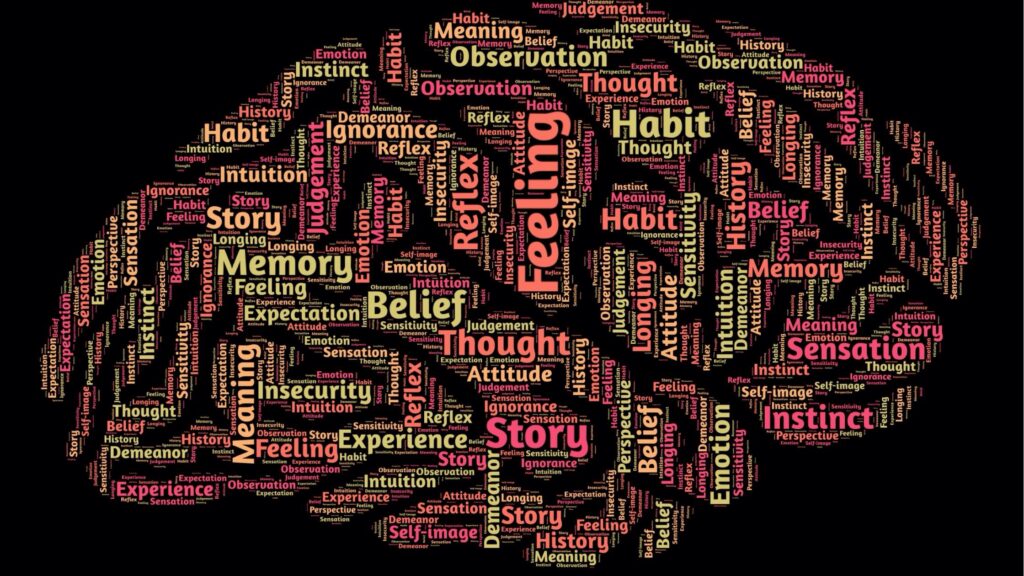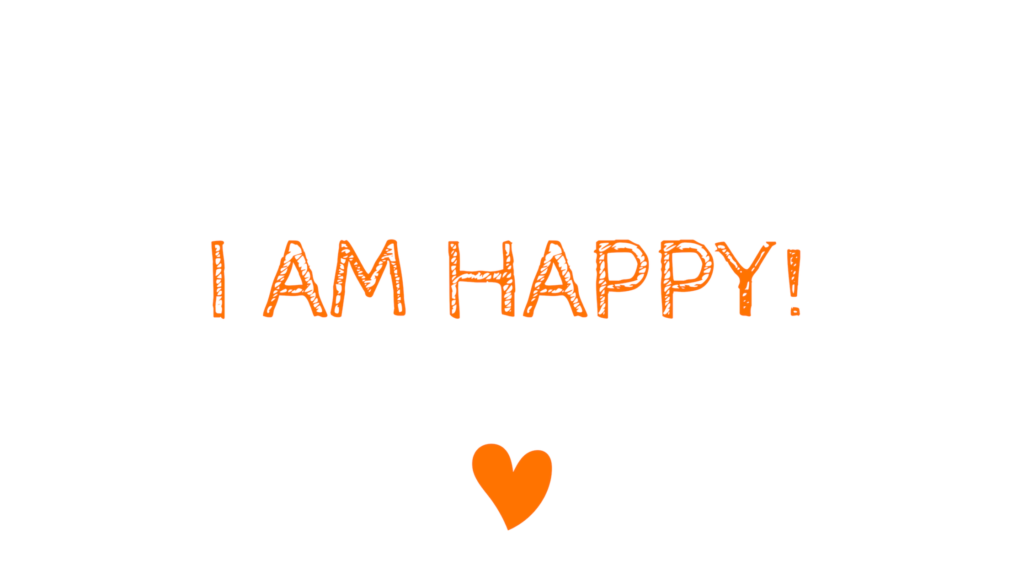
“Self talk is the ongoing internal conversation we have with ourselves, which influences how we feel and how we behave.” www.alleydog.com
Our self talk amounts to every single thing we think, and say to ourselves, every day. And there is a lot of it.
We think somewhere between 12000 and 60000 thoughts, per day, and on average 80% of those thoughts are negative, and 95% are the same repetitive thoughts from the day before, and the day before that. (2005 study by the National Science Foundation).
It is mind boggling!
If most of our thoughts are negative, and we also keep repeating them, it’s any wonder we find ourselves struggling to feel happy.
Negative self talk is defined as any expression, thought or word, that is counter productive and has the effect of demotivating oneself. (Kari Romeo Tedx Talk.)
From that we can ascertain that positive self talk is any expression, word or thought that is intuitive and has the affect of motivating us, uplifting us and making us more happy.
We are often not even aware of our self talk, nor the fact that so much of it is negative. And when we do notice, the negativity is so drummed into us we think it’s normal…
…and we often believe it to be true.
It is for this reason that our self talk can have a huge impact on our lives and our happiness. It also means that with practice we can create new habits of self talk, and have 95% of those happy thoughts repeat themselves every day.

Healthy self talk is actually necessary, as it helps us control ourselves and our emotions. We literally tell ourselves what to do as we plan our actions, or the day ahead, and we can shift how we feel in any moment by changing our thoughts. (Tricky, but possible)
We bounce ideas off ourselves, evaluate situations, consolidate our memories and generally regulate ourselves using our self talk.
Self talk is also considered an important part of our language development, and supports self regulation in the thinking and behaviour of children. www.masterinstitute.com.au

The short answer is everything. Whatever we’re doing, at any time of day, we will be talking to ourselves about it.
Think about it…
Getting ready to go out? “Got my keys, wallet and phone?”
Cooking dinner? “Where is the large pan?”
Drop something on the floor? “Oh Beeeep” (in my house anyway).
Driving the car?
Mindlessly scrolling?
Watching TV?
We basically self talk our way through our days!
There are a number of different types of self talk that we use in different situations.
Generally speaking our self talk falls into 3 categories;
All of our self talk will fall into one of these categories depending on the meaning we give it or how we feel about the thought, as well as the language we use.
For example, we can be reflecting on something that has happened in the past that we didn’t necessarily like. In that moment we get to choose (really) whether we think about how bad it was, or whether we focus on what we learned, or just how relieved we are that it’s over.

The slant away from happy self talk, and towards the negative comes from a lifetime of conditioning. We almost can’t help it. When we are tiny, everything about us is celebrated. From our first moment, our first smile, our first steps and even our basic bodily functions are happily celebrated by our caregivers…
We also adore ourselves and have absolutely no notion that we are not completely perfect!
The first set of not so happy messages come along when we’re pretty young. Our parents may be flustered and snap that they’re too busy to listen to us (I’m not worth listening to says our inner voice). At school our differences are noticed and pointed out, we can be too short, too slow, too stupid. The media shows us the most beautiful, most fit, funniest, richest and most successful people in the world, and we are left wanting. And social media allows us to directly compare our state of affairs to those same people’s houses, cars, holidays and bodies on a constant 24 hour bender. And, on top of that we get perfect highlights of all the people we’ve ever known, as well as many we will never meet. Sometimes social media leaves me feeling anxious… and this is why. The insidious, underlying ‘My Life just can’t compare’ inner self talk.

Negative self talk can ruin our happiness and steal our joy, lowering our general self image, body image and affecting our relationships.
Positive and neutral self talk however both have a positive and helpful affect.
In a work or school setting constant negative self talk can leave us feeling as though we’re not enough. We are then also more vulnerable to bullying and more likely to miss out on potential possibilities because we’re afraid of looking bad or being noticed.
We can also forego any happiness or fulfilment in our work as we strive to prove ourselves to others.
If we have positive self talk, and a happy self image we are less likely to be bullied and more likely to say yes to opportunities, trust and act on our intuition and find happiness in what we do.
If you have ever stood in front of the mirror and felt unhappy with your reflection, then you have probably said some pretty nasty things to yourself, and will know that negative self talk can completely diminish our body image. Low body confidence has been shown to have far reaching effects, undermining academic achievement and performance at work. Women in particular will not raise their hand in school or speak up in a meeting, take part in sporting activities, and sometimes not even show up to a job interview or their place of work if they are having a low body confidence day. Men are not immune to this either.
Our self talk also affects our relationships. The happier we are within ourselves, the happier we will be with our friendships, family and close relationships. If our confidence is low, and we have trouble loving ourselves, then trusting someone else to love us, and being happy to accept that love is much more difficult. Negative self talk causes us to push people away.

It is possible to create new habits of happy self talk. All self talk is habitual, whether negative or positive, so with a decision, and practice we can make ours more positive.
There is a difference between saying “I am so stupid” and “Oops, I’ll try not to do that again”. Try speaking to yourself the way you would speak to a good friend.
Saying positive statements to yourself that affirm how you want to feel, or express gratitude for what you do have. If you want a challenge, say your positive affirmations in the mirror… this will really highlight any resistance you have to thinking (and feeling) good. There are books and cards available to help develop this habit.
Notice it and either pivot to a new gentler statement (as in number 1) or challenge it with facts. Are you really the stupidest person in the world?
Smile and say thank you when someone pays you a compliment… don’t argue with them.
Your feelings pretty accurately indicate whether your self talk is sitting in the positive or negative end of the scale. Stop for a moment and see where you are, and whether you need to reach for a better feeling thought.
When thinking about the past choose to see events in a different way. Our memories are not exactly trustworthy anyway, so telling yourself a different version is perfectly ok.
If your thoughts are running away with themselves down a negative rabbit hole, try and change the subject by doing something. Go for a walk, read a book, have a conversation with someone or do an all consuming activity that you love…
Aka, sitting quietly and breathing. This is the process of bringing your attention completely into the present moment. Sitting comfortably and bringing all your focus onto your breath, or the sounds around you, or the sensations in your body, or even staring at something and taking in all the details of it’s form are different ways of practicing mindfulness.
It takes time, effort and practice to change any lifetime habit. Don’t expect over night transformation, and be kind to yourself when your self talk is not perfect!
Our self talk is powerful, and can have a profound affect on our happiness depending on whether we decide to have positive and happy thoughts, or negative ones. Becoming aware of what we’re thinking rather than letting our thoughts ‘happen to us’, and gently steering ourselves towards more positive self talk gives us more control over our thoughts and will ultimately improve our happiness.
In short, If you want to feel happier, think happier thoughts!

© 2020 All rights reserved